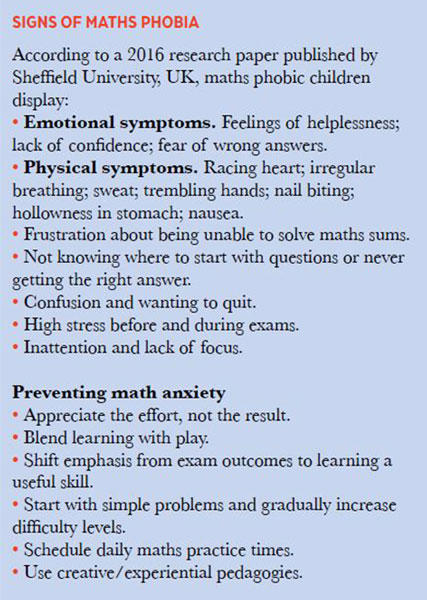Helping children overcome maths anxiety
The onus is on parents and teachers to help children overcome maths phobia and anxiety by creating stress-free learning environments and stimulating love of math – Jayalakshmi Vaidyanathan

Ravi Saxena, a class V student of a private school in Delhi, is running late for school. He hasn’t finished his math homework, and is anxious and frustrated as he races to complete the assignment before the school bus arrives in 20 minutes. His mother is annoyed because he avoided and procrastinated completing his math work last night. While she tries to help him, she observes that Ravi is struggling to solve an easy sum. Emotions are running high as time is ticking.
For most school-going children, maths evokes negative emotions such as hatred, fear, anxiety and helplessness. And most parents, naively and misguidedly, believe that the best way to improve children’s maths capability is to encourage them to practice, practice, practice. But though ritual practice may increase their speed and knowledge, it does little to address and alleviate children’s maths phobia. Consequently, despite hours of practice and rote learning, negative emotions associated with the subject are likely to adversely affect children’s ability to perform on exam-day. Unsurprisingly, children with positive emotions such as curiosity, joy, play, and wonder towards math, perform better in examinations.
 A 2017 study conducted by the US-based Society for Research in Child Development found that when educators and parents boost children’s positive emotions and minimise negative feelings related to subjects, students acquire greater control over their academic performance. According to the researchers, students’ emotional well-being promotes and improves learning outcomes.
A 2017 study conducted by the US-based Society for Research in Child Development found that when educators and parents boost children’s positive emotions and minimise negative feelings related to subjects, students acquire greater control over their academic performance. According to the researchers, students’ emotional well-being promotes and improves learning outcomes.
“Maths requires students to think logically and critically, and not merely regurgitate mugged answers. Therefore children need to be in a positive frame of mind to think critically and solve math problems. School teachers and parents must create stress-free learning environments, focus on life skills development and promote emotional well-being for children to excel in maths,” says Mamta Chandra, principal of the CBSE-affiliated Samsidh Mount Litera Zee School, Bangalore.
Uday Nair, maths teacher at the Jhamtse Gatsal Children’s Community, Tawang, Arunachal Pradesh, concurs. “There is a plethora of research studies which highlight that a child’s learning capability is influenced by her emotional state. With a subject like maths, which requires logical and critical thinking, a child must be emotionally stable to comprehend questions and provide well thought-out logical answers,” says Nair.Parents need to be aware that maths phobia can lead to several negative outcomes for children, ranging from poor performance in maths tests and exams to rejection of math-related activities. The onus is on parents and teachers to help children overcome  maths anxiety by creating stress-free learning environments and stimulating love of maths. Unfortunately most parents and teachers tend to pass on their own maths anxiety to children. Educationists advise parents/teachers to avoid comments such as “I’ve always been hopeless with numbers or I don’t like maths, it’s very difficult.”
maths anxiety by creating stress-free learning environments and stimulating love of maths. Unfortunately most parents and teachers tend to pass on their own maths anxiety to children. Educationists advise parents/teachers to avoid comments such as “I’ve always been hopeless with numbers or I don’t like maths, it’s very difficult.”
“Parents and teachers often pass on their own maths phobia to children and tend to popularise the myth that maths competency requires extraordinary intelligence. They need to shed their own prejudices about maths learning and focus on creating stress-free environments where there is no fear of failure and punishment, and they should stress that math learning is an enjoyable experience. Children are naturally curious and creative, they need to be encouraged to develop love of maths through experiential pedagogies,” advises Dr. Stella Pandhare, principal of the NURTURE International School, Bangalore.
Online resources
Here are six online resources that help you make math learning enjoyable for children.
Websites
https://www.khanacademy.org/
https://schoolyourself.org/
https://www.mathplanet.com/
Apps:
Sushi Monster
YodelOh Math Mountain
DragonBox Algebra 5+

















Add comment